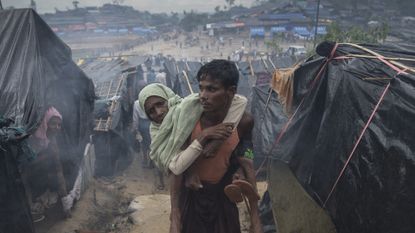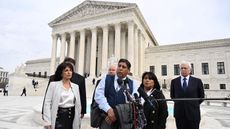‘It is the internet’: Rohingya launch $150bn Facebook lawsuit over genocide hate speech
Victims in UK and US legal action claim social media giant failed to prevent incitement of violence

Facebook’s failure to combat hate speech was a key factor in the 2017 genocide of Rohingya Muslims in Myanmar, a legal action launched today has claimed.
Lawyers for the victims in the UK and US have filed claims worth more than $150bn in compensation in “one the largest group claims for victims of a crime against humanity brought before a domestic court anywhere in the world”, The Times said.
The group alleges that “Facebook’s algorithms promoted and amplified hate speech against the Rohingya”, the paper added, prompting a “campaign of violence” described by one UN human rights chief as “a textbook example of ethnic cleansing”.
Subscribe to The Week
Escape your echo chamber. Get the facts behind the news, plus analysis from multiple perspectives.

Sign up for The Week's Free Newsletters
From our morning news briefing to a weekly Good News Newsletter, get the best of The Week delivered directly to your inbox.
From our morning news briefing to a weekly Good News Newsletter, get the best of The Week delivered directly to your inbox.
‘Hate, division and misinformation’
According to a legal filing submitted to the Northern District Court in San Francisco, Facebook “was willing to trade the lives of the Rohingya people for better market penetration in a small country in southeast Asia”.
“In the end, there was so little for Facebook to gain from its continued presence in Burma [now Myanmar], and the consequences for the Rohingya people could not have been more dire,” the complaint letter adds. “Yet, in the face of this knowledge, and possessing the tools to stop it, it simply kept marching forward.”
Arguing that its clients are the victims of “serious violence, murder and/or other grave human rights abuses”, the lawyers said the campaign of hate against the Rohingya was “fomented by extensive material published on and amplified by the Facebook platform”.
Referencing a 2018 admission by Facebook that it failed to combat hate speech against the Muslim minority group, the lawyers added: “Despite Facebook’s recognition of its culpability and its pronouncements about its role in the world, there has not been a single penny of compensation, nor any other form of reparations or support, offered to any survivor.”
Tensions between the Rohingya and Myanmar’s other ethnic groups, especially the majority Bamar, have been ongoing for decades.
But lawyers for the UK- and US-based victims of the 2017 violence argue that the “algorithms that power the US-based company promote disinformation and extreme thought that translates into real-world violence”, Al Jazeera reported.
“The scope and violent nature of… persecution changed dramatically in the last decade, turning from human rights abuses and sporadic violence into terrorism and mass genocide,” the US claim said.
“A key inflection for that change was the introduction of Facebook into Burma in 2011, which materially contributed to the development and widespread dissemination of anti-Rohingya hate speech, misinformation, and incitement of violence – which together amounted to a substantial cause, and perpetuation of, the eventual genocide.”
Facebook has not yet responded to a request for comment on the legal action. A spokesperson for Myanmar’s military junta “did not answer phone calls from Reuters seeking comment on the legal action”.
Under the influence
The total number of Rohingya killed during what the Burmese military, known as the Tatmadaw, termed “clearance operations” remains unclear, according to The Guardian. The medical charity Medicins sans Frontieres (Doctors Without Borders) has placed the figure at over 10,000.
The UK action against Facebook has about 20 claimants, while the US action hopes to “act on behalf of an estimated 10,000 Rohingya in the country”, the paper added.
Around one million Rohingya currently live in the Cox’s Bazar refugee camp in Bangladesh, where the law firms representing the victims – McCue Jury & Partners and Mishcon de Reya – “expect to recruit more claimants”.
In 2018, amid criticism at the levels of hate speech being published on Facebook, founder Mark Zuckerberg told American senators that the company was “hiring dozens more Burmese speakers” to improve its moderation, The Times said.
But “many expressions of hate are still openly posted”, the paper added, with the legal filing citing a number of comments included in a 2018 Reuters article.
“We must fight them the way Hitler did the Jews, damn kalars”, wrote one Facebook user in Myanmar, using a derogatory term for the Rohingya. “These non-human kalar dogs, the Bengalis, are killing and destroying our land, our water and our ethnic people”, another added.
The Times’ Asia editor Richard Lloyd Parry said that the legal case shows that while “Facebook is a phenomenon across the world, there are few countries that have fallen more profoundly under its influence than Myanmar”.
Continuing that “for many there, it is the internet”, he added that scrolling through the social media platform even now shows Facebook has “not taken the warnings seriously, or it has not put enough resources into dealing with the problem” of anti-Rohingya hate speech.
Create an account with the same email registered to your subscription to unlock access.
Sign up for Today's Best Articles in your inbox
A free daily email with the biggest news stories of the day – and the best features from TheWeek.com
-
 'Good riddance to the televised presidential debate'
'Good riddance to the televised presidential debate'Instant Opinion Opinion, comment and editorials of the day
By Harold Maass, The Week US Published
-
 Caitlin Clark the No. 1 pick in bullish WNBA Draft
Caitlin Clark the No. 1 pick in bullish WNBA DraftSpeed Read As expected, she went to the Indiana Fever
By Peter Weber, The Week US Published
-
 Today's political cartoons - April 16, 2024
Today's political cartoons - April 16, 2024Cartoons Tuesday's cartoons - sleepyhead, little people, and more
By The Week US Published
-
 How technology helps and harms endangered languages
How technology helps and harms endangered languagesUnder the radar Languages are disappearing at fastest rate in history, accelerated by digital dominance of English
By Harriet Marsden, The Week UK Published
-
 How social media is limiting political content
How social media is limiting political contentThe Explainer Critics say Meta's 'extraordinary move' to have less politics in users' feeds could be 'actively muzzling civic action'
By Chas Newkey-Burden, The Week UK Published
-
 Twitter's year of Elon Musk: what happens next?
Twitter's year of Elon Musk: what happens next?Why Everyone's Talking About 'Your platform is dying', says one commentator, but new CEO is aiming for profitability next year
By Chas Newkey-Burden, The Week UK Published
-
 Turns out Facebook isn't as polarizing as previously thought
Turns out Facebook isn't as polarizing as previously thoughtTalking Point New studies show that, contrary to prior belief, the algorithm has little effect on driving polarization
By Theara Coleman Published
-
 Mark Zuckerberg vs. Elon Musk: a tale of the tech tape
Mark Zuckerberg vs. Elon Musk: a tale of the tech tapeUnder the Radar The two men challenged each other to a fight after years of sniping
By Justin Klawans Published
-
 How greater online regulation is prompting fears of a ‘splinternet’
How greater online regulation is prompting fears of a ‘splinternet’feature Government pressure worldwide means the internet is not as open as it once was
By Sorcha Bradley Published
-
 Donald Trump, the Pope and the disruptive power of AI images
Donald Trump, the Pope and the disruptive power of AI imagesfeature AI-generated deepfakes blur reality and could be used for political disinformation or personal blackmail
By The Week Staff Published
-
 The Supreme Court, Section 230 and the future of the internet
The Supreme Court, Section 230 and the future of the internetfeature Lawsuits brought against tech giants could have far-reaching consequences for the internet as we know it
By Richard Windsor Published